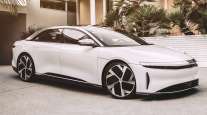Bloomberg News
Electric-Vehicle Charging Startup Amply Power Secures $13.2 Million

[Stay on top of transportation news: Get TTNews in your inbox.]
Startup Amply Power has raised $13.2 million from investors including Soros Fund Management to advance the company’s electric-vehicle charging service for commercial fleets.
The Mountain View, Calif.-based company helps commercial vehicle operators go electric by providing charging infrastructure and fixed prices to charge their vehicles.
Other investors in the round included Siemens Financial Services and existing seed-round investors such as Congruent Ventures, PeopleFund, and Obvious Ventures.

Much of the trucking industry relies on older onboard technology for critical functions, which can hurt reliability and efficiency. So is it time for fleets and their technology vendors to implement faster replacement cycles for onboard tech? Seth Clevenger talks to Ray Greer of Omnitracs and Deryk Powell of Velociti. Hear a snippet, above, and get the full program by going to RoadSigns.TTNews.com.
Amply sets up the physical charging infrastructure for commercial fleets like school buses and uses its software to manage the charging. The money will help the company deliver on existing contracts and scale up from pilot-phase contracts with fleets in the single digits to ones that it calls production scale.
“Coming out of the coronavirus, irrespective of what we’re having in oil pricing, fleet customers will continue to look toward electric mobility as the better option,” said Vic Shao, Amply’s chief executive officer.
Despite the economic uncertainty brought on by the coronavirus, much of the company’s business pipeline is with public-sector customers. Shao expects more commercial vehicles to electrify because of government mandates requiring cleaner fuels, regardless of the virus’s impact.
For commercial vehicle operators, the company could remove a key barrier to going electric. Battery-powered vans could be cheaper than diesel-powered ones in the U.S. by 2022 and by 2021 in Europe, according to research from BloombergNEF.
“Time and again, the major hurdle most electric truck and bus pilots face is the charging infrastructure,” Iti Jain, vice president at Siemens Financial Services said in a statement. “Amply presents a unique opportunity for us and the industry, to accelerate fleet adoption by removing this needless complexity.”
Want more news? Listen to today's daily briefing:




